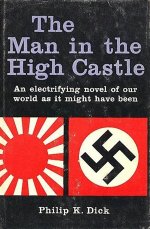Book Review: The Man in the High Castle 16 years, 11 months ago by Martey Dodoo

If there is one science fiction author whose works disturb me, it is Phillip K. Dick. The first work of his that I read was an essay entitled "How to Build a Universe That Doesn't Fall Apart Two Days Later." I was expecting a tome on how to construct an universe in a science fiction novel that readers would find believable. Instead, I found myself reading about the transient nature of reality. The strangest part of the essay is when Dick recounts how a visit from a woman wearing an ichthys necklace causes him to realize that he does not actually live in 1970s America, but in the Roman Empire just after the death of Christ. He considers the possibility that the "false reality" that he sees around himself is yet another machination of Satan, designed to distract the faithful and drive them into despair. The first novel by Dick that I read was The Divine Invasion, which is even stranger (barren space planets! exiled deities! the prophet Elijah! the Second Coming!).
Due to this obsession with the nature of reality, it makes perfect sense that one of Dick's early masterpieces, The Man in the High Castle, is set in an alternative universe where FDR was assassinated in 1933 (as opposed to losing the 1940 election) and the Axis nations crushed the Allies in World War II. In the post-war world that follows, the United States are split by the two major powers of the world, the Germans and the Japanese. Unsurprisingly, their alliance soon dissolves into a cold war.
As one would expect, the lands controlled by the Third Reich are consumed by all of the racist evils of the Nazi regime. The populations of both Africa and Eastern Europe have been almost completely exterminated. Chattel slavery has been re-established in the American South. Concentration camps are built in upstate New York. By contrast, the Japanese-occupied Pacific states seem relatively mild, despite being entrenched in a rigid class system that causes the book's American characters to feel inferior to their Japanese counterparts.
In this alternate 1960s, the bestselling novel in America is The Grasshopper Lies Heavy, a piece of alternate history where Roosevelt is not assassinated and the Allies win the war. This book-within-a-book helps shield Dick from criticism. While I was initially mildly annoyed that the Greater East Asia Co-Prosperity Sphere of Dick's world is far too civilized, considering the realities of Japanese rule, the benefits of American domination shown are even more ridiculous: $1 televisions sent to the developing world (prescient of the OLPC project), along with massive amounts of financial and technical assistance designed to industrialize and educate.
Despite the fact that the Nazis have managed to drain the Mediterranean (creating vast tracts of new farmland) and reach both Mars and Venus, nobody in the book seems particularly excited about the future. Regardless of whether they live under foreign rule by the Japanese or Germans or the free-but-powerless peoples of the Midwest and the Rockies, the Americans seem despondent - they are not a world power, and have no chance to become one. The Japanese are concerned about German superiority in technology and military might, cognizant of the fact that the exception made for them in German racial policies is one of political necessity, as opposed to ideological orthodoxy. Even the German characters in the novel, whom one would expect would to fervent believers in Nazi ideals, are disgusted by the fact that they must support the most radical elements of the government in order to ensure that their country does not initiate a nuclear war.
Without giving away too much of the ending, it is fair to state the world of The Man in the High Castle is a dead end. There are characters who are described as "idealistic," but they are firmly focused on the past. The book shows an Earth where humanity has lost its way, and is utterly unable to find its way back.